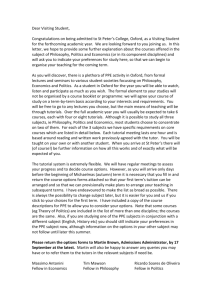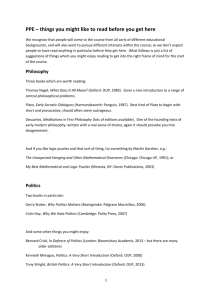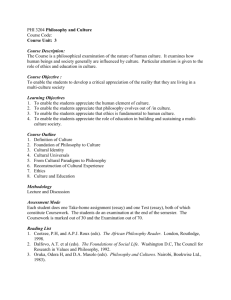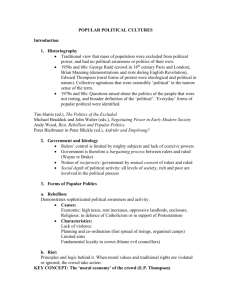POLS2011 Politics and Human Rights (Soc Sci) (elective of six
advertisement
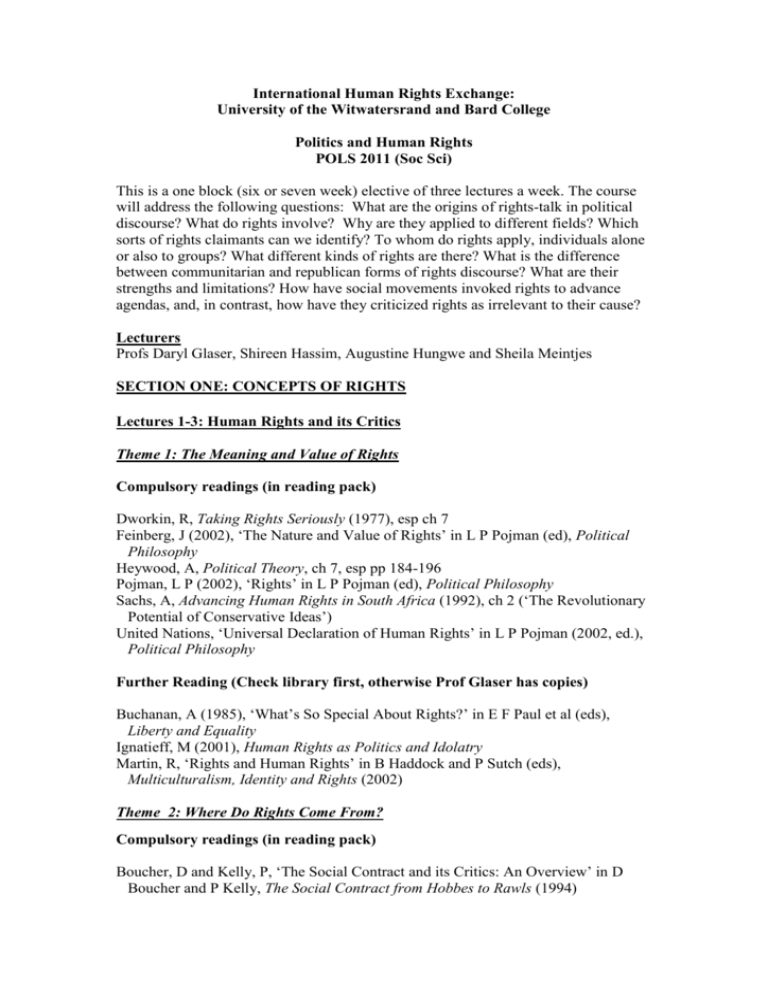
International Human Rights Exchange: University of the Witwatersrand and Bard College Politics and Human Rights POLS 2011 (Soc Sci) This is a one block (six or seven week) elective of three lectures a week. The course will address the following questions: What are the origins of rights-talk in political discourse? What do rights involve? Why are they applied to different fields? Which sorts of rights claimants can we identify? To whom do rights apply, individuals alone or also to groups? What different kinds of rights are there? What is the difference between communitarian and republican forms of rights discourse? What are their strengths and limitations? How have social movements invoked rights to advance agendas, and, in contrast, how have they criticized rights as irrelevant to their cause? Lecturers Profs Daryl Glaser, Shireen Hassim, Augustine Hungwe and Sheila Meintjes SECTION ONE: CONCEPTS OF RIGHTS Lectures 1-3: Human Rights and its Critics Theme 1: The Meaning and Value of Rights Compulsory readings (in reading pack) Dworkin, R, Taking Rights Seriously (1977), esp ch 7 Feinberg, J (2002), ‘The Nature and Value of Rights’ in L P Pojman (ed), Political Philosophy Heywood, A, Political Theory, ch 7, esp pp 184-196 Pojman, L P (2002), ‘Rights’ in L P Pojman (ed), Political Philosophy Sachs, A, Advancing Human Rights in South Africa (1992), ch 2 (‘The Revolutionary Potential of Conservative Ideas’) United Nations, ‘Universal Declaration of Human Rights’ in L P Pojman (2002, ed.), Political Philosophy Further Reading (Check library first, otherwise Prof Glaser has copies) Buchanan, A (1985), ‘What’s So Special About Rights?’ in E F Paul et al (eds), Liberty and Equality Ignatieff, M (2001), Human Rights as Politics and Idolatry Martin, R, ‘Rights and Human Rights’ in B Haddock and P Sutch (eds), Multiculturalism, Identity and Rights (2002) Theme 2: Where Do Rights Come From? Compulsory readings (in reading pack) Boucher, D and Kelly, P, ‘The Social Contract and its Critics: An Overview’ in D Boucher and P Kelly, The Social Contract from Hobbes to Rawls (1994) Hart, H L A, ‘Are There Any Natural Rights?’ in L P Pojman (ed), Political Philosophy (2002) Further Reading (Check library first, otherwise Prof Glaser has copies) Gewirth, A, ‘The Epistemology of Human Rights’ and reply by Alasdair MacIntyre, ‘A Critique of Gewirth’s Argument and the Notion of Rights’ in L P Pojman (ed), Political Philosophy (2002) Kymlicka, W, Contemporary Political Philosophy (2002), ch 2 (‘utilitarianism’) Morrow, J, History of Western Political Thought (2005), ch 3 (‘Politics and Freedom’) and ch 8 (2005) (‘The Sanctions of Nature’) Singer, P, The Expanding Circle: Ethics and Sociobiology (1981) Theme 3: The Critics Compulsory readings (in reading pack) Etzioni, A, ‘Too Many Rights, Too few Responsibilities’ in M Walzer (ed), Towards a Global Civil Society (1995) Morrow, J, History of Western Political Thought (2005), ch 3 (‘Politics and Freedom’) Pateman, C, The Disorder of Women (1989), esp ch 2 Wolgast, E, ‘Wrong Rights’ in L P Pojman, Political Philosophy (2002) Further Reading (Check library first, otherwise Prof Glaser has copies) Dworkin, G, ‘Paternalism’ in L P Pojman (ed), Political Philosophy (2002) Kymlicka, W, Contemporary Political Philosophy (2002), ch 2 (‘utilitarianism’) Pettit, P, Republicanism (1997), chs 1 & 2 Phillips, A, Democracy and Difference (1993), ch 6 Squires, J, Gender in Political Theory (1999), chs 4 & 5 Walzer, M, ‘The Communitarian Critique of Liberalism’, Political Theory vol 18, no 1 (1990) Tutorial Question: What are human rights? How are they distinguishable from rights in general? What do critics of rights (and human rights) object to? Lectures 4-6: Contemporary Human Rights Controversies Theme 1: Can There Be Universal Human Rights? The Implications of National and Global Diversity Compulsory readings (in reading pack) Glazer, N, ‘Individual Rights Against Group Rights’ in. W Kymlicka (ed), The Rights of Minority Cultures (1995) Jones, P, ‘Human Rights and Diverse Cultures: Continuity or Discontinuity?’ in S Caney and P Jones (eds), Human Rights and Global Diversity (2001) Kymlicka, W, Multicultural Citizenship (1995), esp chs 2 & 3 Kukathas, C, ‘Are There Any Cultural Rights?’ in W Kymlicka (ed), The Rights of Minority Cultures (1995) Further Reading (Check library first, otherwise Prof Glaser has copies) Caney, S, ‘Human Rights, Compatability and Diverse Cultures’ in S Caney and P Jones (eds), Human Rights and Global Diversity (2001) Waldron, J, ‘Minority Rights and the Cosmopolitan Alternative’ in W Kymlicka (ed), The Rights of Minority Cultures (1995) Theme 2: Freedom, Social Justice and Rights Compulsory readings (in reading pack) Berlin, I, ‘Two Concepts of Liberty’ in L P Pojman (ed), Political Philosophy (2002) Sunstein, C, Designing Democracy: What Constitutions Do (2001), ch 10 (‘Social and Economic Rights? Lessons from South Africa’) Wolff, J, An Introduction to Political Philosophy (1966), chs 4 (‘The Place of Liberty’) & 5 (‘The Distribution of Property’) Further Reading (Check library first, otherwise Prof Glaser has copies) Feinberg, ‘Liberty and the Grounds for Coercion’ in L P Pojman (ed), Political Philosophy (2002) Levin, A, ‘Negative Liberty’ in in E F Paul et al (eds), Liberty and Equality (1985) Pettit, P, Republicanism (1997), esp ch 1 (‘Beyond Negative and Positive Liberty’) Pogge, T, ‘An Egalitarian Law of Peoples’, Philosophy and Public Affairs 23 (1994) Rawls, J, A Theory of Justice (1971) Rawls, J, The Law of Peoples (1999) Sachs, A, Advancing Human Rights in South Africa (1992), esp chs 11, 14, 15 [on affirmative action] Sen, A, Development as Freedom (1999) Singer, P, One World: The Ethics of Globalization (2002) Tutorial Question: How does national and cultural diversity affect the plausibility of concepts of human rights? Can a human rights case be made for global justice? SECTION 2: FEMINIST CRITIQUES Lectures 7-9: What Is Political ? Liberalism, Feminism and the Question of Human Rights. Anne Philips: Universal Pretensions in Political Thought, Destabilizing Theory: Contemporary Feminist Debates, ed. Barrett & Philips, Stanford Univ. Press, 1992 Hilary Charlesworth, What are women’s international human rights ?, Human Rights of Women. National and International Perspectives, R.J Cook (ed.), Univ. of Pennsylv.Press, 1994. J. Oloka-Onyango and S. Tamale: The personal is political, or why women’s rights are indeed human rights: An African perspective on international feminism, Human Rights Quarterly Vol 17 (1995). Azza Karam, Democrats without Democratization: Challenges to Women in Politics in the Arab World, Shirin M. Rai ( ed) International Perspectives on Gender and Democratization, Women's Studies at York, Basingstoke: Macmillan, 2000, p.66-82. Karen Brown Thompson, “Women’s Rights are Human Rights’, in Sanjeev Khagram, James v. Riker and Kathryn Sikkink (eds.) Restructuring World Politics, University of Minnesota Press, 2002. Nüket Kardam, “The Emerging Global Gender Equality Regime from Neoliberal and Constructivist Perspectives in International Relations,” International Feminist Journal of Politics 6(1) (2004): 85-109. Myra Marx Ferree, “Globalization and Feminism: Opportunities and Obstacles for Activism in the Global Arena,” in M. M. Ferree and A. M. Tripp, eds., Global Feminism: Transnational Women’s Activism, Organizing, and Human Rights (New York: New York University Press, 2006). Aili Mari Tripp, “The Evolution of Transnational Feminisms: Consensus, Conflict, and New Dynamics,” in Ferree and Tripp as above Tutorial Question: Should human rights extend into the private sphere? Lectures 10-12: Culture and Human Rights: Contemporary Dilemmas. Brian Barry “The Abuse of ‘Culture,’” pp. 252-91 in Culture and Equality: An Egalitarian Critique of Multiculturalism (Cambridge, MA: Harvard University Press, 2001). Iris Marion Young, “The Ideal of Impartiality and the Civic Public” pp. 96-121 in Justice and the Politics of Difference (Princeton: Princeton University Press, 1990). Susan Moller Okin, “Is Multiculturalism Bad for Women?” Boston Review 22 (October/November 1997). Richard A. Shweder, “What About ‘Female Genital Mutilation’? And Why Understanding Culture Matters in the First Place,” Daedalus 129(4) (2000): 209-32. Uma Narayan, “Contesting Cultures: ‘Westernization’, Respect for Cultures and Third World Feminists”, in Uma Narayan Dislocating Cultures: Identities, Traditions and Third World Cultures, Routledge 1997. Amina Lawal: Sentenced to death for Adultery Amnesty International http://web.amnesty.org/pages/nga-010902-background-eng Tutorial Question: In 2002 Amina Lawal, a 30-year old Muslim woman, was sentenced to death by stoning by an Islamic court in Katsina State, Northern Nigeria. The sentence was overturned on appeal a year later. The initial decision of the Shariah court provoked an international human rights campaign spearheaded by Amnesty International. The campaign was almost as controversial as the court judgement. For this tutorial, you should search the internet for coverage of the Lawal petition and for critiques of the Amnesty International approach to the case. In particular, read the open letter written by Nigerian women’s rights advocacy group BAOBAB. SECTION 3: CASE STUDIES Lectures 13 – 15: The War on Terror Dr. Augustine Hungwe (Bard College) An interrogation of the U.S. “War on Terror” Section Description This section will focus on the empirical aspects of the politics and human rights discourse. The section will thus engage the emerging morphology of the U.S. “War on Terror” and the responses of the American civil society to this unfolding political and human rights dispensation in the post 9/11 era. Hence, this section will also explore some of the dimensions and nuances of the U.S. “War on Terror”, with a view to broaden the students’ appreciation of the theory and praxis of Human Rights and Politics. In essence, the purpose of this section is to generate serious questions and reflections on politics and human rights epistemological concerns and engagements. Lecture 13 Theme: A critique of the U.S. “War on Terror” & an incisive investigation into the C.I.A Secret Flights (“Rendition”) Compulsory readings (in reading pack) Koechler, R, The War on Terror, its impact on Sovereignty of States, and its implications for human rights and civil liberties(2002) Amnesty International, “Rendition” and Secret Detention: A global system of human rights violations: Questions and Answers (2006) Further Reading CRS Report for Congress, Renditions: Constraints Imposed by Laws on Torture (2006) Fukuyama, F, The End of History (2006) Pham, P, Beyond Power Politics: International Law and Human Rights Discourse in the Post-9/11 World (2005) Lecture 14 Theme: U.S. response to Terror-Guantanamo Bay Detention Centre Compulsory readings (in reading pack) United Nations Economic and Social Council, Commission on Human Rights, Report on the situation of Detainees at Guantanamo Bay (2006) Unclassified Verbatim Transcript of Combatant Status Review Tribunal Hearing for ISN 10024 (Guantanamo) Further Reading 1. Denbeaux, M, Report on Guantanamo Detainees (2005) 2. Davenport, C, State Repression and Political Order (2007) Lecture 15 Theme: Further U.S. Response to Terror- The “No Fly” List Compulsory Readings (in the reading pack) ACLU of Northern California’s Analysis of FBI’s FOIA Response, “FBI documents fail to reveal how the ‘No fly’ list makes Americans safer” (2003) Court Case: Class action against the U.S. “No fly” list by the American Civil Liberties Union of Washington (2004) Further Reading Amnesty International Report on the State of the World’s Human Rights (2007) (Website: http://web.amnesty.org/library/) Huntington, S.P, The Clash of Civilizations (2005) Tutorial Question: Is the U.S. “War on Terror” justifiable? At what point does a “war on terror” become a “war of terror”? Who are the “enemies” and “victims” of the U.S. “War on Terror”? Lectures 16-18: Human Rights in South Africa since 1994 Professor Daryl Glaser Compulsory readings (in reading pack) Dugard, J, ‘The New Constitutionalism: A Triumph for Liberalism? A Positive View’ in R W Johnston and D Welsh (eds), Ironic Victory (1998) Jeffrey, A ‘The New Constitutionalism: A Triumph for Liberalism? Some Doubts’ in R W Johnston and D Welsh (eds), Ironic Victory (1998) Republic of South Africa, ‘Bill of Rights’ Karthy Govander, ‘Assessing the Constitutional Protection of Human Rights in South Africa During the First Decade of Democracy in S Buhlungu et al (eds), State of the Nation: South Africa 2005-2006 (2006) Further Reading (Check library first, otherwise Prof Glaser has copies) Murray, C and Pillay, A, ‘Equality and Democracy: Are Political and Civil Rights for All Guaranteed?’ in R Calland and P Graham (eds), Democracy in the Time of Mbeki (2005) Sachs, A, Advancing Human Rights in South Africa (1992) Thipanyane, T, ‘Human Dignity and Democracy: Can Socioeconomic Rights be Realised Without Human Rights?’ in R Calland and P Graham (eds), Democracy in the Time of Mbeki (2005) Tutorial Question What is the relevance of competing human rights theories to the evolution of rights-based politics in South Africa? Does the South African experience offer universal lessons? Lectures 19-21: Questions of Human Rights in the Darfur Conflict Professor Sheila Meintjes Compulsory readings (in reading pack) De Waal, Alex (2005 rev ed) Preface to Famine that Kills: Darfur, Sudan Oxford: OUP vi-xxi Johnson, D.H. ‘Darfur:Peace, Genocide and Crimes Against Humanity in Sudan’ in Violence, Political Culture and Development in Africa edited by P. Kaarsholm. Oxford: James Currey. Hoile, David (2005) ‘Darfur, Human Rights and Hypocrisy’, Darfur in Perspective. London: European-Sudanese Public Affairs Council. Chapter 7 Kajee, Ayesha ‘The Regional and International Dimensions of the Crisis in Darfur’ in Peace in the Balance: the Crisis in the Sudan edited by B. Raftopoulos and K. Alexander. Cape Town: Institute for Justice and Reconciliation Chapter 5. Flint, J & De Waal, A. (2005) Darfur: A Short History of a Long War. London: Zed. Chapters 5 and 6 Tutorial Questions. How do we assess the criteria for determining whether human rights abuses amount to genocide or not, particularly in the absence of verifiable information? Do you think that the Darfur crisis was genocide or not?




